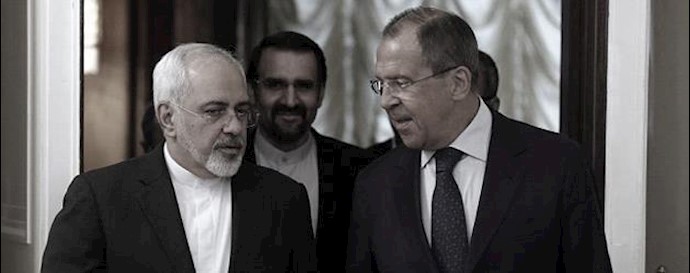Moscow and Tehran have stepped up coordination inside Syria as they move to protect Bashar al-Assad’s control over his coastal stronghold, according to officials in the US and Middle East, creating a new and complicating issue for Washington’s diplomatic goals.
Senior Russian and Iranian diplomats, generals and strategists have held a string of high-level talks in Moscow in recent months to discuss Assad’s defense and the Kremlin’s military buildup in Syria, The Wall Street Journal reported according to these officials.
This included a secret visit in late July by the commander of Iran’s elite overseas military unit, the Qods Force. Maj. Gen. Qasem Soleimani directs Tehran’s military and intelligence support for the Assad regime and is one of the most powerful leaders of the Islamic Revolutionary Guard Corps, or IRGC.
Iranian Foreign Minister Javad Zarif also visited Moscow last month to discuss Syria and other issues with his Russian counterpart, Sergei Lavrov.
Those visits “all come within the framework of this coordination,” Syrian Foreign Minister Walid al-Moallem told state media last week. “There is deep coordination on all levels between us and Moscow, and between us and Tehran, and I can say to whomever wants…they can join too.”
U.S. officials said they haven’t unraveled the full extent of the cooperation or its intention. “We assume [the Russian buildup in Syria is] being coordinated with the Iranians,” said a senior U.S. official, who said the U.S. tracked Gen. Soleimani’s trip to Moscow.
However, much of the activity from both sides in recent months have been concentrated in the coastal region of Latakia, the stronghold of Assad’s family and his Alawite sect, which has come under pressure from rebel forces to the north, threatening to cut it off from the capital Damascus.
U.S. officials have said the Russians have been deploying fighter aircraft and attack helicopters outside the Latakia airport, as well as tanks and armored personnel carriers.
IRGC military advisers and soldiers are also deployed in Latakia, as well as soldiers from Tehran’s close political and military ally, the Lebanese militia Hezbollah, they said.
A U.S. defense official said the Pentagon believes Gen. Soleiman’s trip to Moscow was “very important” in relation to the Russian buildup in Latakia. “What we are seeing now is the manifestation of that meeting, and that there is some sort of Iran nexus,” the official said.
The coordinated Iranian and Russian support for Assad poses a formidable obstacle to the diplomatic aims of the Obama administration, which wants to remove the Syrian dictator from power.
As support from Moscow and Tehran pours into Syria, the U.S. has moderated its demands that Mr. Assad go before a transition takes place. Secretary of State John Kerry said over the weekend that Mr. Assad may be able to remain as part of a transition to a new government.
Senior U.S. and European officials said they suspect there is significant cooperation between Moscow and Tehran inside Syria.
Putin, they said, appears to be using the Syria conflict to try to increase the Kremlin’s influence in the Middle East and in the international diplomacy focused on finding a post-Assad government.
Tehran, meanwhile, wants to maintain Syria’s coastal region and the areas adjacent to the Lebanese border as the key supply route for arms going into Lebanon and the Palestinian territories.
Russia and Iran have staunchly supported Assad since the uprising began in Syria in early 2011. Their presence in the Latakia region isn’t new: Russian personnel have been seen transiting through the airport since 2014. Hezbollah and IRGC commanders have been based in the coastal hotels.
But over the past three months, Moscow and Tehran have appeared to be preparing to bolster the region’s defenses, according to Syria analysts and Arab officials.
Syrian rebel forces have made substantial territorial gains in the northern province of Idlib during this time and have been pressing down into Latakia. Further victories by the insurgents could cut off Damascus from Mr. Assad’s home base, they said.
Gen. Soleimani visited a front line battlefield north of Latakia in June that was adjacent to the Turkish border and Idlib, according to Arab media reports. There he said Iran’s and Syria’s leadership were jointly planning an operation that would “surprise the world.”
Weeks later, Gen. Soleimani visited Moscow and met with top Russian security officers, according to U.S. and European officials. These included Defense Minister Sergei Shoyguand the heads of Russian military intelligence and defense industries.
The Kremlin denied Gen. Soleimani’s visit, which Washington charged was a violation of a United Nations travel ban.
But over the weekend, Syrian opposition activists released a video showing Russian tanks and soldiers at the same front visited by Gen. Soleimani. They said it was recorded at around the time he visited in June.
The U.S. and other Western governments are closely watching for what actions Russia, Iran and the Syrian regime take now.
One possibility, said analysts, is an operation around the eastern, ancient city of Palmyra to target Islamic State militants.
Putin has described the Russian presence in Syria as a counterterrorism operation, and he is scheduled to address the U.N. General Assembly in New York on Sept. 28.
“The first major operation will tell us what their intentions are,” said Elias Farhat, a retired Lebanese army general and military strategist, referring to Iran and Russia.
He said evidence from the ground indicates the Russians, Iranians and Hezbollah are establishing a joint-operational command center in Latakia, near the airport.
The increasing Russian-Iranian defense of Assad is placing the Obama administration in a diplomatic and strategic bind.
Kerry and other U.S. officials have voiced concerns in recent days that Russia’s deployment could further destabilize Syria and place Moscow’s troops in conflict with a U.S.-led air campaign.
Iran, Russia Seen Coordinating on Defending Assad in Syria
RELATED ARTICLES








